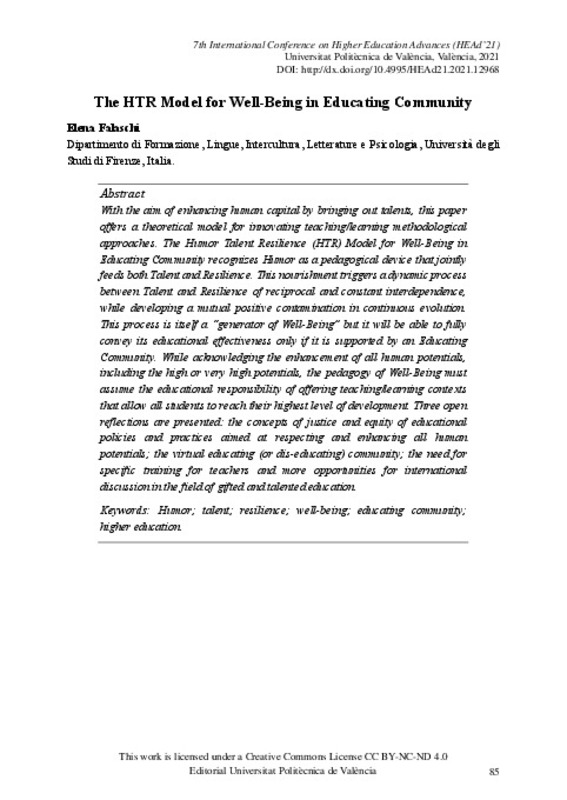JavaScript is disabled for your browser. Some features of this site may not work without it.
Buscar en RiuNet
Listar
Mi cuenta
Estadísticas
Ayuda RiuNet
Admin. UPV
The HTR Model for Well-Being in Educating Community
Mostrar el registro sencillo del ítem
Ficheros en el ítem
| dc.contributor.author | Falaschi, Elena
|
es_ES |
| dc.date.accessioned | 2021-09-21T10:17:19Z | |
| dc.date.available | 2021-09-21T10:17:19Z | |
| dc.date.issued | 2021-07-26 | |
| dc.identifier.isbn | 9788490489758 | |
| dc.identifier.issn | 2603-5871 | |
| dc.identifier.uri | http://hdl.handle.net/10251/172939 | |
| dc.description.abstract | [EN] With the aim of enhancing human capital by bringing out talents, this paper offers a theoretical model for innovating teaching/learning methodological approaches. The Humor Talent Resilience (HTR) Model for Well-Being in Educating Community recognizes Humor as a pedagogical device that jointly feeds both Talent and Resilience. This nourishment triggers a dynamic process between Talent and Resilience of reciprocal and constant interdependence, while developing a mutual positive contamination in continuous evolution. This process is itself a “generator of Well-Being” but it will be able to fully convey its educational effectiveness only if it is supported by an Educating Community. While aknowledging the enhancement of all human potentials, including the high or very high potentials, the pedagogy of Well-Being must assume the educational responsibility of offering teaching/learning contexts that allow all students to reach their highest level of development. Three open reflections are presented: the concepts of justice and equity of educational policies and practices aimed at respecting and enhancing all human potentials; the virtual educating (or dis-educating) community; the need for specific training for teachers and more opportunities for international discussion in the field of gifted and talented education. | es_ES |
| dc.format.extent | 9 | es_ES |
| dc.language | Inglés | es_ES |
| dc.publisher | Editorial Universitat Politècnica de València | es_ES |
| dc.relation.ispartof | 7th International Conference on Higher Education Advances (HEAd'21) | |
| dc.rights | Reconocimiento - No comercial - Sin obra derivada (by-nc-nd) | es_ES |
| dc.subject | Higher Education | es_ES |
| dc.subject | Learning | es_ES |
| dc.subject | Educational systems | es_ES |
| dc.subject | Teaching | es_ES |
| dc.subject | Humor | es_ES |
| dc.subject | Talent | es_ES |
| dc.subject | Resilience | es_ES |
| dc.subject | Well-being | es_ES |
| dc.subject | Educating community | es_ES |
| dc.title | The HTR Model for Well-Being in Educating Community | es_ES |
| dc.type | Capítulo de libro | es_ES |
| dc.type | Comunicación en congreso | es_ES |
| dc.identifier.doi | 10.4995/HEAd21.2021.12968 | |
| dc.rights.accessRights | Abierto | es_ES |
| dc.description.bibliographicCitation | Falaschi, E. (2021). The HTR Model for Well-Being in Educating Community. En 7th International Conference on Higher Education Advances (HEAd'21). Editorial Universitat Politècnica de València. 85-93. https://doi.org/10.4995/HEAd21.2021.12968 | es_ES |
| dc.description.accrualMethod | OCS | es_ES |
| dc.relation.conferencename | Seventh International Conference on Higher Education Advances | es_ES |
| dc.relation.conferencedate | Junio 22-23, 2021 | es_ES |
| dc.relation.conferenceplace | València, Spain | es_ES |
| dc.relation.publisherversion | http://ocs.editorial.upv.es/index.php/HEAD/HEAd21/paper/view/12968 | es_ES |
| dc.description.upvformatpinicio | 85 | es_ES |
| dc.description.upvformatpfin | 93 | es_ES |
| dc.type.version | info:eu-repo/semantics/publishedVersion | es_ES |
| dc.relation.pasarela | OCS\12968 | es_ES |








